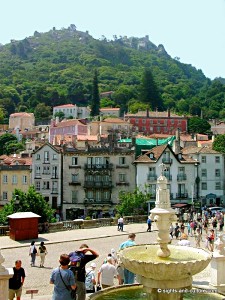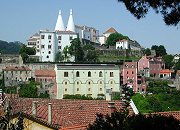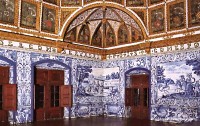 |
Portugal - Sintra
~ Sights, Views and History ~
|
 |
| |
Cultural Landscape
of Sintra - UNESCO World Heritage
|
|
|
|

Sintra
is simply a must, if you are in the area of Lisbon! The old Moorish
city, which was recaptured in 1147 by the Portuguese King Alfons
1, has been the summer residence of the Portuguese kings and the
aristocracy for more than 600 years. Today Sintra is a popular tourist
spot, surely not least because of its mild humid climate and its
picturesque location at the foot of the small coastal mountains
Sierra de Sintra that rise sharply above the city. The main attraction,
however, are its historical sights.
 The landmark of Sintra
is the National Palace (Palacio Nacional
da Sintra),
with its huge, conic, white twin chimneys, which rise above the
large palace kitchen, and are visible from quite a distance.
It is one of the most important examples of regal architecture in
Portugal and for that reason is classified as a National Monument.
The palace was continuously inhabited as a royal summer residence
from the 14th to the 20th c. It is a conglomerate of different
architectural styles. Elaborate wood carved ceilings, which arch
over the rooms and marvellous wall decoration with ceramic tiles
from the 15th/16th centuries, the Azulejos,,
bear witness to the Arabic influence. The tiles were manufactured
in Seville and it is the oldest and most extensive collection on
the Iberian Peninsula. The landmark of Sintra
is the National Palace (Palacio Nacional
da Sintra),
with its huge, conic, white twin chimneys, which rise above the
large palace kitchen, and are visible from quite a distance.
It is one of the most important examples of regal architecture in
Portugal and for that reason is classified as a National Monument.
The palace was continuously inhabited as a royal summer residence
from the 14th to the 20th c. It is a conglomerate of different
architectural styles. Elaborate wood carved ceilings, which arch
over the rooms and marvellous wall decoration with ceramic tiles
from the 15th/16th centuries, the Azulejos,,
bear witness to the Arabic influence. The tiles were manufactured
in Seville and it is the oldest and most extensive collection on
the Iberian Peninsula.
 The art of manufacturing Azulejos The art of manufacturing Azulejos  was brought to Spain and Portugal
by the Arabs. Since then this craft developed into a traditional
art and became a special feature of Portuguese architecture. Elaborate
wall paintings from tiles decorate banqueting halls of palaces as
well as churches, public buildings, private homes, staircases and
fountains. Even street signs on houses are made from decorative
tiles! was brought to Spain and Portugal
by the Arabs. Since then this craft developed into a traditional
art and became a special feature of Portuguese architecture. Elaborate
wall paintings from tiles decorate banqueting halls of palaces as
well as churches, public buildings, private homes, staircases and
fountains. Even street signs on houses are made from decorative
tiles!
Further attractions of Sintra
|

High up on
the hilltops of the Sierra de Sintra, the well preserved remains
of the imposing Moorish Castle (and
the Pena Palace rise above the city. The
Moorish castle (Castelo dos Mouros)
was built by the Moors in the 8th and 9th centuries and its walls
wind themselves like a small Chinese wall round the rock ridges.
From the towers and walls one has a spectacular outlook onto the
city and its surroundings. |

On the
highest hilltop the pseudo medieval Pena Palace
(Palacio National da Pena) with a 270 hectare large garden
is situated. This marvellous fairy tale castle was begun in
1840 as a royal summer residence on behalf of the German Prince
Consort of Queen Maria II, Ferdinand of Saxonia Coburg-Gotha and
is the most important example of Portuguese architecture in the
Romantic period. It is also called the ‘Portuguese Neuschwanstein’ –
in fact, a very fitting comparison! |

Another special
tourist attraction is the
Quinta da Regaleira in the
historic center of Sintra. It is a 4
ha dreamlike property with a palace and a large park, lakes,
fountains and bridges, with grottos, caves and a tennis
court. The Quinta was built between
1904 and 1910 according to a project by the Italian
architect Luigi Manini and on behalf of António Augusto
Carvalho Monteiro (1848-1920). The Quinta da Regaleira is
listed as UNESCO World Heritage Site.
|
Just 11 km eastwards
from Sintra there is
Azenhas do Mar.
The
village on
the cliffs offers a spectucular view! It is located at the coast
of the municipality of Sintra, parish of Colares. The place
developed along the Cameijo stream, which flows into the
Atlantic and breaks the cliffs of the coast. At the base
there is a beach with an oceanic pool.
In
addition to the picturesque natural landscape, there are also
some buildings in the Smooth Portuguese Style with tiles on the
facades, such as the school and the residence for the teacher.
|
 |
 |
 |
 |
| Palacio da Pena
|
Palacio - detail |
Castelo dos Mouros |
Azenhas do Mar near Sintra |
 UNESCO World
Heritage Sites in Portugal UNESCO World
Heritage Sites in Portugal
Portugal - Sintra - Tourism Information
|